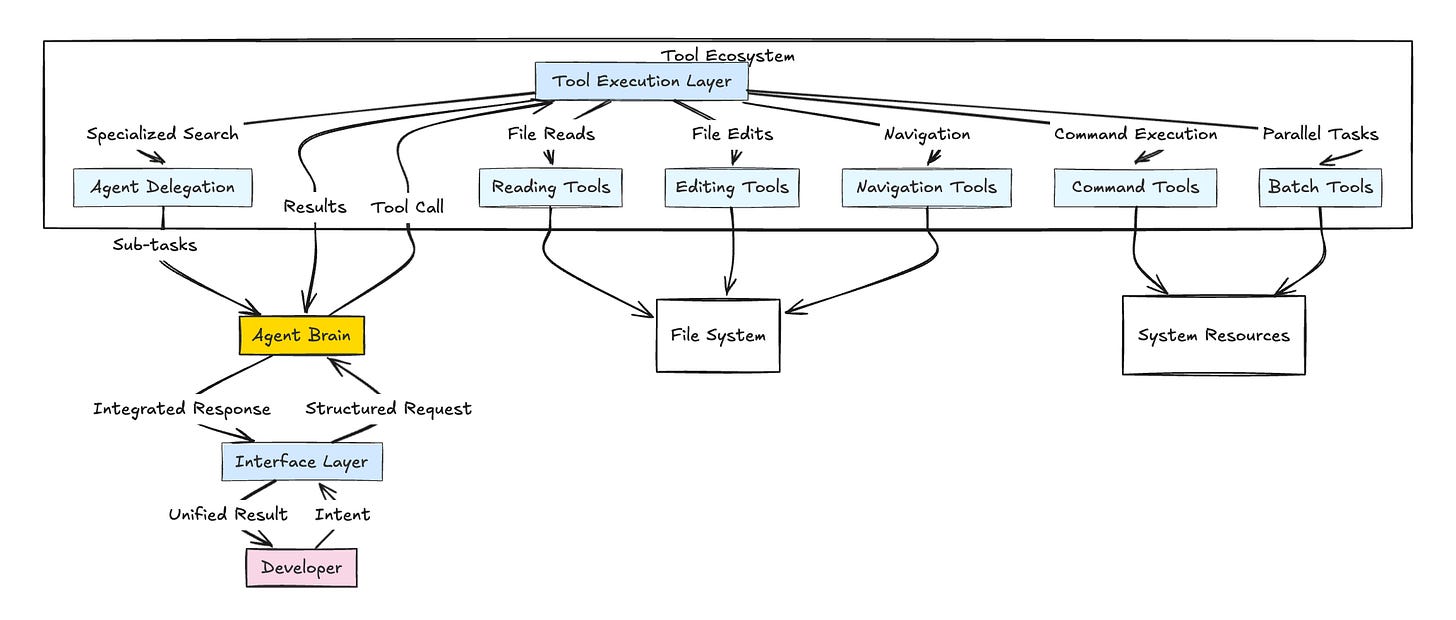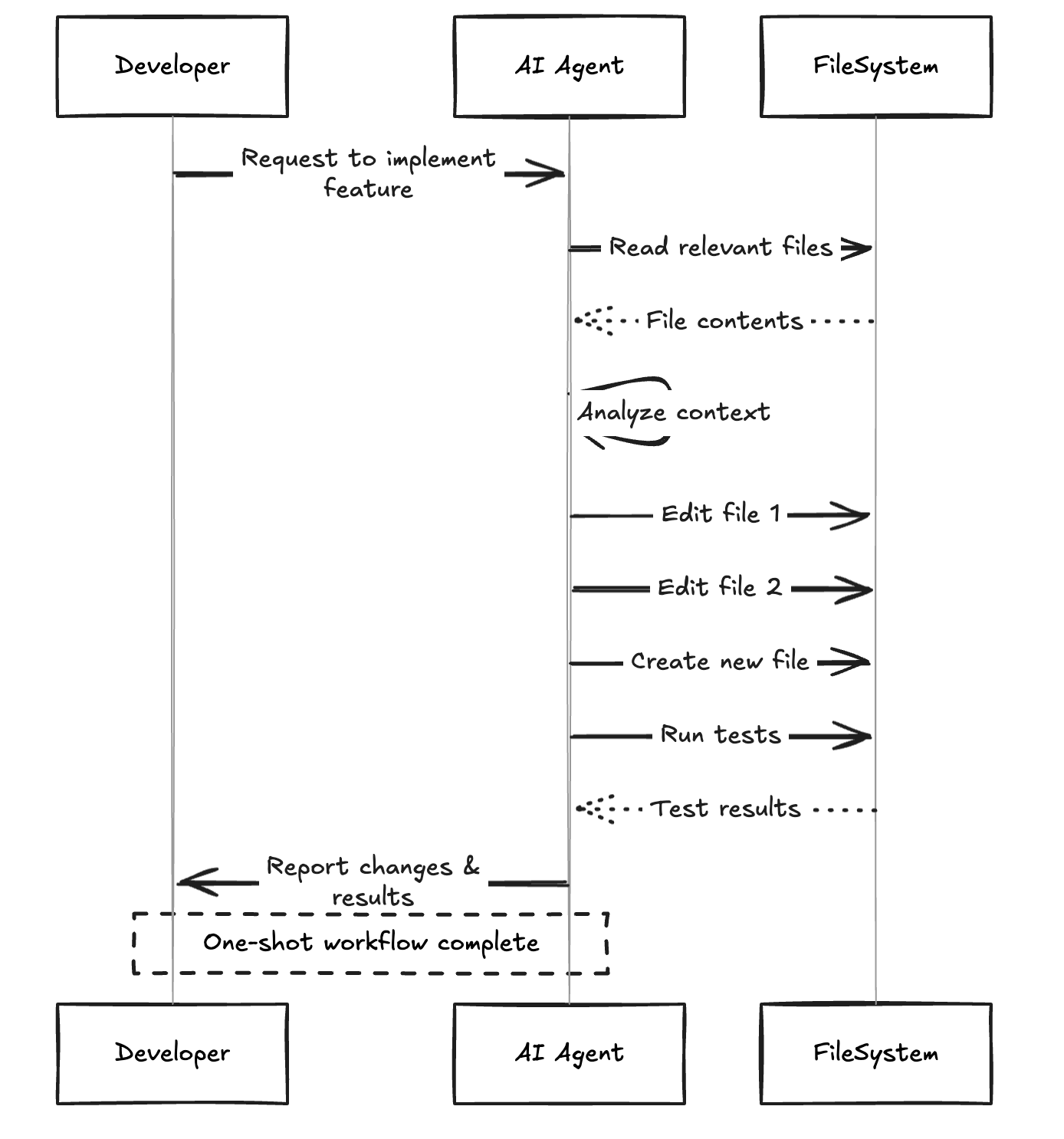The One-Shot Paradigm with Agents
When it comes to AI-driven workflow automation, most tools offer incremental improvements—a better search engine here, a refined code editor there. But every so often, something truly game-changing appears. At Pocketflow, we're on a mission to redefine the way we tackle large, multi-step tasks.
Over the past two months, we have studied the designs behind powerful AI agents like Cursor and Claude Code. These tools have created new ways for AI to interact with codebases:
One prompt can trigger a multi-phase operation, removing repetitive tasks and maintaining context throughout.
The agent infers deeper context—understanding which files exist, what your target environment looks like, or how code changes might ripple through your project.
Here's how these advanced tools approach development:
Reading and Viewing Files
When you need to review code, Claude Code's View tool offers a streamlined approach:
{ "file_path": "src/utils/helpers.js", "offset": 0, "limit": 2000 }What this means: Instead of navigating through your file system, opening an editor, and scrolling to the right location, you can instantly access exactly what you need with a single command. The system:
Reads up to 2000 lines from the given offset
Truncates lines longer than 2000 characters
Annotates each returned line with a number for easy reference
Surgical Edits and Full Replacements
Modifying code should be precise and deliberate. Modern agents offer both targeted edits and complete rewrites:
Edit:
{ "file_path": "server/routes/userRoutes.js", "old_string": "res.send('Hello')", "new_string": "res.json({ message: 'Hello, World!' })" }What this means: No more manual searching for the right line to modify. Simply specify what needs to change, and the system finds and replaces it while preserving surrounding code.
{ "file_path": "server/routes/userRoutes.js", "content": "console.log('New Content')" }What this means: When you need to completely rewrite a file, this direct approach eliminates the copy-paste dance between terminals and editors.
Comprehensive Navigation
Finding the right files is often half the battle in large projects:
LS:
{ "path": "/absolute/path/to/project", "ignore": "node_modules" }GlobTool:
{ "pattern": "**/*.ts", "path": "/home/workspace" }GrepTool:
{ "pattern": "function\\s+authenticate", "path": "/home/workspace", "include": "*.js" }What this means: Instead of running multiple commands to locate files and then search within them, these tools allow you to quickly find the right files and the specific code you need to work with, all through a unified interface.
Parallel Task Handling
Modern development involves many interdependent processes that can benefit from parallelization:
BatchTool:
{ "description": "Run build and tests concurrently", "invocations": [ { "tool_name": "Bash", "input": { "command": "npm run build" }}, { "tool_name": "Bash", "input": { "command": "npm test" }} ] }What this means: No more waiting for one task to finish before starting another. Run your build and tests simultaneously, getting results faster and maintaining your flow state.
Agent Delegation & Specialized Search
Complex tasks often require specialized attention:
dispatch_agent:
{ "prompt": "Find references to 'encryptPassword' in userAuth.js" }What this means: Rather than manually grepping through your codebase, a specialized agent can handle targeted searches, understanding not just textual matches but semantic relationships in your code.
The Future of One-Shot Automation
Having an agent that is capable of interacting with a codebase the way a developer would is empowering to both traditional and non-traditional developers. This new paradigm leverages complementary strengths of humans and AI, creating a partnership greater than the sum of its parts.
Rhetoric on how the future belongs not to those who write the most code, but to those who can effectively direct AI agents while focusing human creativity on the problems most worthy of solving already exists.
This looks like humans defining goals and AI handles implementation details. This also looks like AI catching common bugs and humans identifying subtle logic errors. For traditional developers, we see a shift from syntax wranglers to system architects, from code producers to code directors. And for non-traditional developers, they are armed with implementation power—domain experts, product managers, and designers can now build with less engineering bottlenecks.
At Pocketflow, we're building an engine that coalesces the best ideas in code reading, editing, concurrency, and environment management. We believe the result will be a technology that acts almost like an extension of your own intentions.
Stay tuned as we roll out more capabilities.
Join our waitlist to one-shot workflows and play with our framework!




